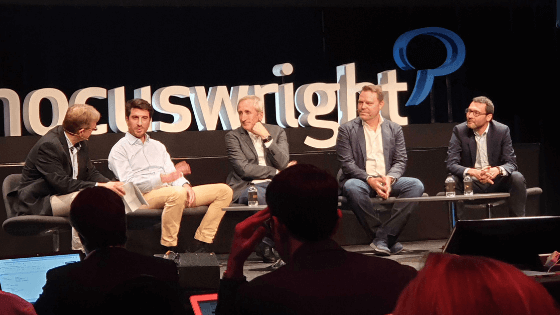Phocuswright Europe 2019 Review
20/05/2019
Written by Frederic Kalinke
Last week we had the pleasure of attending Phocuswright Europe in Amsterdam. It was great to hear from the top brass at Airbnb, eDreams, Facebook, Costa Crociere and Expedia but also to have Aaron actively participate in both an executive interview and a roundtable on rail. We’re very much looking forward to continuing the conversation at Phocuswright USA at the end of the year.
This post summarises the key takeaways* from the main events.
At the Speed of Rail Roundtable
– Philippe Cayrol, VP Corporate and Business Development at BlaBlaCar
– Thomas Drexler, Senior Associate Partner at The Travel Consulting Group
– Aaron Gowell, Co-Founder and Chief Conductor at SilverRail
– Julien Nicolas, Deputy CEO at OUI.sncf
This roundtable was Phocuswright’s first ever dedicated rail event (we’re obviously delighted). There is good reason for its inclusion in the agenda: rail travel is exploding, especially in Asia, with China’s grand plans to connect its high speed trains to Southeast Asia; a growing interest in rail by OTAs; and an increasing trend among customers to choose trains over planes given the environmental benefits (how long will it be before the words fly-shame and train-bragging make it into the dictionary!?).
The first topic that was discussed was the fragmented nature of the rail industry and the lack of industry standards. Tom Drexler used the example of there not being a consistent definition for “children” across countries, making booking international train tickets harder. This is unlike air where everything is standardised. Aaron made the point that standardisation is partly a function of the formation of Global Distribution Systems that were birthed and sponsored by big national airlines (Amadeus = Iberia, SaS, Air France and Lufthansa; Sabre = American Airlines). In rail, there has been no external sponsor, which created the opportunity to build a brilliant rail-only IT partner.
The conversation moved to rail’s role on third party platforms. Philippe and Julien talked about Blablacar’s genesis from a pure peer-to-peer car-pooling service to offering other transportation services, with its purchase of Ouibus and upcoming partnership with SNCF. Dirk, the moderator, provided some wider industry perspective by commenting that only 7% of trains are bought on OTAs, making rail a “direct product”. Aaron said that this is likely to change given rail’s potential in providing a cost-effective acquisition channel for OTAs from which hotels can be upsold (this video from Phocuswright Research makes it clear that Alibaba and Ctrip are already executing on this opportunity). Futhermore, OTAs can’t afford to miss out on rail given that it is becoming the number one transport choice for those concerned about their carbon footprint. Some airlines in Northern Europe are already feeling the effects of the environmentally conscious.
Aaron talks a bit more about the opportunities and challenges in the rail industry in the Executive Interview below.
Dana Dunne – Chief Executive Officer at eDreams ODIGEO
Dana’s interview was interesting as he discussed some of the technology investments eDreams is making to improve the user experience. He was candid in how competitive online travel was and said that winning the user experience battle was key. Paraphrasing Henry Ford, he said that businesses could not follow Henry Ford’s maxim that “you can have any color you want, as long as it’s black”, but instead needed to offer relevant and personalised products. The two customer experience examples that stood out were their use of machine learning to decide which flight results to display on a mobile device based on behavioural data and their virtual reality mobile app which measures your bag and tells you if it conforms to the airline’s baggage policy. He also noted how they are broadening their product portfolio beyond flights and quoted that 4 years ago, they sold additional products on only 20% of their flight booking but it’s now at 70%. Dana said that their data shows that customers are stickier when they sell more products and cancellation rates are lower.
Norbert Stiekema – Chief Strategy and Digital Officer at Costa Crociere
The cruise business is less well known compared to the air and hotel business so it was fascinating to hear Norbert discuss some of its dynamics from a sales and marketing perspective. The first attribute of the cruise industry is that it’s constrained by supply. Ships are usually at full capacity so the main challenge is having enough vessels to satisfy demand (it’s therefore no surprise to see Richard Branson pumping money into Virgin Voyages). Given the high capital investments required to build and maintain cruises ships, it’s very important that Costa delivers a magical on-ship experience with plenty of successful upsell and crossell activities (10% of their revenue comes from excursions). Getting a positive return on billions of dollars of capital must be no easy feat!
It was also very interesting to hear Norbert describe their typical customers as being over 60 in small provincial towns in Italy and how the ‘awareness’ and ‘consideration’ phases often happen in hair salons and coffee shops. Travel agents, he said, where still by far the most successful sales channel over web properties and call centres. He said that word of mouth was therefore vital to their marketing strategy but that online was still important, especially as a nurturing tool. He said that Costa have invested heavily in CRM so that they understand which channel per prospect is most likely to increase the chances of conversion. It was also encouraging to hear Norbert describe the investments Costa is making to improve sustainability given the cruise industry’s poor green credentials.
Jereon Merchiers – Managing Director EMEA at Airbnb
Following their recent purchase of HotelTonight, it was fascinating to hear Joreon’s view of Airbnb’s place in the travel ecosystem and how they’re thinking about the future. Joreon made it clear that hotels have been a part of Airbnb’s platform for a long time but they’ve always made sure that the hotels on offer are independent and not the mainstream brands that are available on the hotel aggregators. In Joreon’s words, Airbnb has offered an alternative distribution channel for hotels with big personalities and great hospitality. The acquisition of HotelTonight which brings “fantastic people, pioneering mobile technology and a set of established API connections” is simply accelerating Airbnb’s hotel distribution strategy.
When asked about Airbnb’s relationship with OTAs and whether they are now the “enemy”, Joreon was quick to say that Airbnb was not obsessed with any competitors and that there is plenty of space for everyone to grow. It was interesting to hear what we thought the three things were that made Airbnb valuable and unique: 1) having original inventory, which makes cost per acquisition cheaper 2) huge brand recognition and loyalty, especially among Millennials (he quoted that 70% of respondents mentioned Airbnb as their favourite brand in a recent study) and 3) proprietary payment and feedback systems. He also mentioned Airbnb’s growing corporate travel offering which demonstrates that businesses want to give their people authentic experiences as the proposition is not based on greater cost efficiency.
Given Airbnb’s recent hiring of Fred Reid as Global Head of Transportation, and their vision to reimagine travel by ‘building an end-to-end travel platform that combines where you stay, what you do, and how you get there, all in one place’, it will be very interesting to see which other products and services they add to the platform. We’re obviously hoping that rail is added soon, particularly given that the millennial audience is waking up to the environmental impact of flying (see the concept of “flight shame”) and that trains can offer a truly local and authentic experience.
Tech Heads Roundtable – Digital Transformation
– Dara Brady – Digital Director at Ryanair
– Ian Di Tullio – SVP Guest Services at Accor
– Christian Langer – VP Digital Strategy at Lufthansa Group
– Dirk Tietz Chief Digital & Transformation Officer, DER Touristik Group
The term ‘Digital Transformation’ is an overused buzzword meaning that it often lacks meaning and bite. However this roundtable was a pleasant surprise as the panel was lively and brought the concept into real focus. Dirk, from DER Touristik Group had a good definition for digital transformation as being a movement that encompasses the use of ‘digital technology to acquire and retain customers, manage partner relationships, improve internal processes and reflect on business models’. Christian from Lufthansa described how their digital transformation has led to fundamental shift in the way they perceive the customer journey from being “a one-way arrow which is heavily transactional” to an “infinite 8 which is more relational in nature” between the brand and the consumer. Although this idea was not unpacked further, it echoed Jim Collins’s idea of a flywheel with digital technologies enabling positive feedback loops that improve products and services, thereby creating long-lasting relationships with customers.
A clear sign that a company is actually undergoing digital transformation is in its human capital and technology investments. Dara from Ryanair explained how their engineering team had gone from 25 to 600, from having no “digital centre of excellence” to having three. Christian also mentioned their dedicated “innovation hub” in Berlin which screens the market for interesting travel technology startups which it either invests in, adopts or learns from.
The panel agreed that speed of experimentation was another important attribute of digital transformation. Ian from Accor explained that agility was a key focus but that legacy technology meant that big brands could not move as quickly as they’d like. Christian also noted that an airline is somewhat constrained by experimentation given their core focus on safety and having a “check-list culture”.
Brent Hoberman – Co-Founder and Executive Chairman firstminute capital, Founders Factory, Founders Forum
This session was useful given the event’s overall “Empires on Edge” agenda which explores how large dominant travel brands face up to smaller, nimble upstarts. Founders Factory, which Brent chairs, incubates and accelerates several travel startups. Two which were mentioned are BeRightBack, a millennial subscription business which builds and sells tailored itineraries based on individual preferences and Kyte, which has created a new GDS which helps travel companies of any size offer flights, hotels and payments in seconds.
Brent said there were three things that help improve the probability of startup success: 1) having a great team, including mentors to improve credibility 2) going after big problems that need solving 3) focussing on the “why now?”; i.e. make sure you build something that is relevant right now and not next year.
Nikhilesh Ponde – Head of Global Travel Strategy at Facebook
Despite Facebook’s well-publicised gaffes around data privacy, it’s adoption and engagement figures are incredible. Nikhilesh said that 2.1B users engage with its platform every day and travellers use it at every stage in the customer journey. It was no surprise to hear Facebook are focussed on expanding their range of ads for travel brands, particularly in the inspiration phase and to also hear they have plans for “in-destination” formats.
The most interesting part of this interview was Nikhilesh’s views on the need for a ‘zero-friction’ future where customer experiences are brilliant and consistent across apps and devices. He referenced Netflix and how they record timestamps so users can pick up where they left off if they switch devices. He also quoted a study of 600 businesses which found that it took on average 22 clicks to go from landing to purchase. There is nothing new here but it provides further evidence that there is still huge room for companies to optimise their customer journeys, particularly on mobile. He ended by discussing the rise of “conversational commerce” and how Facebook are releasing product catalogues in WhatsApp so people can query and purchase from their favourite brands in-app.
* This blog is the result of scribbles in a conference notepad, so some of the facts and figures may be inaccurate!




